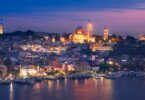Anastasia Tenisheva
MOSCOW: Russians are racing to try and obtain European visas as some countries impose travel restrictions and fears grow that the European Union could ban Russian tourists from the bloc in response to Moscow’s invasion of Ukraine.
The number of applications for Schengen visas — which give access to most EU countries — submitted by Russians has risen rapidly in recent weeks, according to tour agencies contacted by The Moscow Times.
“I don’t believe the EU will stop issuing all visas to Russians. However, I will feel more comfortable with a Schengen visa, even if I’m not going anywhere right now,” said one Moscow resident who applied for an EU visa after the start of the ban discussions.
The idea of a European ban on Russian tourists has caused heated debate since Ukrainian President Volodymyr Zelensky backed it earlier this month, with supporters saying Russians must be held accountable for their government’s actions and opponents questioning the validity of policy making based on the idea of collective responsibility.
Finland said Tuesday it will reduce the number of visas issued to Russians by 90% starting next month and Lithuania, Estonia and Latvia have recently also announced restrictions on tourist visas for Russians.
The three Baltic states and Finland, which share land borders with Russia, have reported an increase in the numbers of Russians using their airports to transit further into the EU as a workaround to the bloc’s ban on Russian airlines.
The Czech Republic, which holds the EU’s rotating presidency, said last week that it supports the idea of an EU-wide ban on tourist visas for Russians.
“My close friends live in Europe now and they cannot go back to Russia for various reasons, including political ones. I want to visit them soon,” the Moscow resident, who requested anonymity to speak freely, told The Moscow Times.

She said she had paid a tour agency about 25,000 rubles ($409) for her Schengen visa application and expected to collect the visa later this mon
Worries about possible EU restrictions mean that the number of Schengen visa applications made by Russians has doubled in the last two weeks, Maya Lomidze, the head of the Russian Tour Operators Association, told The Moscow Times.
Tatiana, a Russian citizen who moved to the EU several years ago, said she asked family members in Russia to apply for Schengen visas as soon as the travel ban discussion began.
“This situation looks very scary — I live in Europe and my relatives live in Russia. What if the borders are closed and my mother will not be able to visit me?” Tatiana, who declined to give her surname, told The Moscow Times.
Russian tour agency Aero Club Tour, which helps clients obtain foreign visas, has observed a rise in Schengen visa applications since June, according to Alina Protsenko, the head of the company’s visa support department.
Even without an outright ban, the process of applying for European visas is already more complicated for Russians than it was before the war in Ukraine, according to experts.
“The main problem is finding a slot for an embassy visa appointment,” Protsenko told The Moscow Times, adding that the longer-than-normal waiting times were the result of tit-for-tat diplomatic expulsions that have left European embassies in Russia short-staffed.
But the application process has also apparently been tightened.
“Documents, plane tickets and booking confirmations are subject to more thorough scrutiny and in some cases, a visa application may be denied,” Protsenko said.
In addition, a number of countries, including Switzerland, Hungary and Austria, have apparently started issuing Schengen visas only for the duration of a trip.
“Unfortunately, the times when we could apply for a three-day trip [to Europe] and an embassy gave a Schengen visa for three or five years have passed,” Protsenko said.
Russians — of whom about 40 million have foreign passports — were issued about 4 million Schengen visas in 2019 before the coronavirus pandemic, according to EU data.
Arguing for Europe to block entry to Russians, Zelensky said in an interview earlier this month that Russians should “live in their own world until they change their philosophy.”
But critics of a visa ban warn that it would affect the many Russians who oppose the war, including opposition activists and journalists who have been forced to flee by draconian censorship laws and fears of political persecution.
Last week, Russian journalist Yaroslav Varenik said he was denied entry to Estonia and border guards canceled his tourist visa after a two-hour interrogation.
For the moment, Russians can still enter Europe if they have a Schengen visa, since a Schengen visa issued by any one country allows access to the entire bloc.
An EU-wide tourist visa ban for Russian citizens is set to be discussed at the informal EU foreign ministers meeting later this month.
“I don’t think it [a visa ban] will happen,” said Tatiana, the Russian citizen living in the EU. “But I’m worried that one can blame an entire nation for what its government does.”
Courtesy: themoscowtimes






